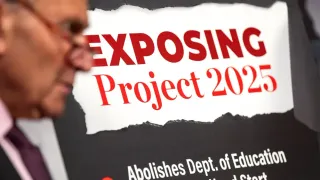April 19, 2023
'Don't Say Gay' Expansion Requested By Desantis Approved
READ TIME: 2 MIN.
The Florida Board of Education on Wednesday approved a ban on classroom instruction about sexual orientation and gender identity in all grades, expanding the law critics call "Don't Say Gay" at the request of Gov. Ron DeSantis as he gears up for an expected presidential run.
The proposal will take effect after a procedural notice period that lasts about a month, according to an education department spokesman.
The rule change would ban lessons on sexual orientation and gender identity from grades 4-12, unless required by existing state standards or as part of reproductive health instruction that students can choose not to take. Florida currently bans such lessons in kindergarten through third grade.
The DeSantis administration put forward the proposal last month as part of the Republican's aggressive conservative agenda, with the governor leaning heavily into cultural divides ahead of his looming White House candidacy.
DeSantis has not commented on the proposal. He previously directed questions to Education Commissioner Manny Diaz Jr., who said it was meant to clarify confusion around the existing law and reinforce that teachers should not deviate from existing curriculums.
"We're not removing anything here," Diaz Jr. said on Wednesday. "All we are doing is we are setting the expectations so our teachers are clear: that they are to teach to the standards."
The prohibition, which began last year with the law banning sexual orientation and gender identity lessons in kindergarten through third grade, has drawn intense backlash from critics who argue it marginalizes LGBTQ+ people and has vague terms that result in self-censorship from teachers. Democratic President Joe Biden has called it "hateful."
The current law is also the root of an ongoing feud with Disney, one of the state's largest employers and political donors.
"Let's put it plainly: This is part of the governor's assault on freedom," Joe Saunders, senior political director of the LGBTQ advocacy group Equality Florida, said in a statement, adding the policy will "further stigmatize and isolate a population of young people who need our support now more than ever."
The entertainment giant publicly opposed the legislation last year, and as punishment, DeSantis pushed lawmakers to give him control of a self-governing district that Disney oversees in its theme park properties.
Before a set of new DeSantis appointees could assume control of the district, Disney's board passed restrictive covenants that strip the incoming members of most of their powers, blunting the governor's retaliation.
DeSantis has directed the chief inspector general to investigate the Disney board's move and vowed to take additional revenge against the company through legislation.






